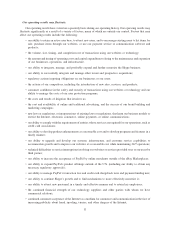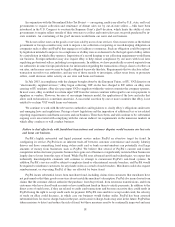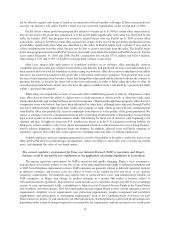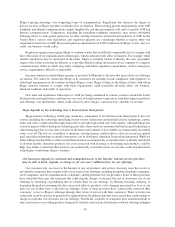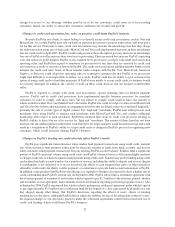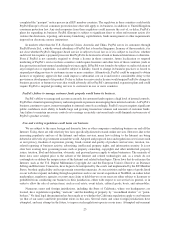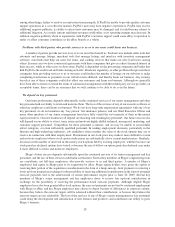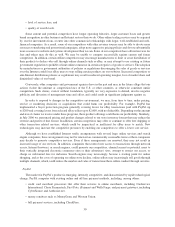eBay 2006 Annual Report Download - page 25
Download and view the complete annual report
Please find page 25 of the 2006 eBay annual report below. You can navigate through the pages in the report by either clicking on the pages listed below, or by using the keyword search tool below to find specific information within the annual report.charges for access to our offerings, whether paid by us or by our customers, could cause us to lose existing
customers, impair our ability to attract new customers, and harm our revenue and growth.
Changes to credit card association fees, rules, or practices could harm PayPal’s business.
Because PayPal is not a bank, it cannot belong to or directly access credit card associations, such as Visa and
MasterCard. As a result, PayPal must rely on banks or payment processors to process transactions, and must pay a
fee for this service. From time to time, credit card associations may increase the interchange fees that they charge
for each transaction using one of their cards. MasterCard and Visa each implemented increases in their interchange
fees for credit cards in April 2005. PayPal’s credit card processors have the right to pass any increases in interchange
fees on to PayPal as well as increase their own fees for processing. These increased fees increase PayPal’s operating
costs and reduce its profit margins. PayPal is also required by its processors to comply with credit card association
operating rules, and PayPal has agreed to reimburse its processors for any fines they are assessed by credit card
associations as a result of any rule violations by PayPal. The credit card associations and their member banks set and
interpret the credit card rules. Some of those member banks compete with PayPal. Visa, MasterCard, American
Express, or Discover could adopt new operating rules or re-interpret existing rules that PayPal or its processors
might find difficult or even impossible to follow. As a result, PayPal could lose its ability to give customers the
option of using credit cards to fund their payments. If PayPal were unable to accept credit cards, its business would
be seriously damaged. In addition, the velocity of trade on eBay could decrease and our business would further
suffer.
PayPal is required to comply with credit card associations’ special operating rules for Internet payment
services. PayPal and its credit card processors have implemented specific business processes for merchant
customers in order to comply with these rules, but any failure to comply could result in fines, the amount of
which would be within Visa’s and MasterCard’s discretion. PayPal also could be subject to fines from MasterCard
and Visa if it fails to detect that merchants are engaging in activities that are illegal or that are considered “high risk,”
primarily the sale of certain types of digital content. For “high risk” merchants, PayPal must either prevent such
merchants from using PayPal or register such merchants with MasterCard and Visa and conduct additional
monitoring with respect to such merchants. PayPal has incurred fines from its credit card processor relating to
PayPal’s failure to detect the use of its service by “high risk” merchants. The amount of these fines has not been
material, but any additional fines in the future would likely be for larger amounts, could become material, and could
result in a termination of PayPal’s ability to accept credit cards or changes in PayPal’s process for registering new
customers, which would seriously damage PayPal’s business.
Changes in PayPal’s funding mix could adversely affect PayPal’s results.
PayPal pays significant transaction fees when senders fund payment transactions using credit cards, nominal
fees when customers fund payment transactions by electronic transfer of funds from bank accounts, and no fees
when customers fund payment transactions from an existing PayPal account balance. Senders fund a significant
portion of PayPal’s payment volume using credit cards, and PayPal’s financial success will remain highly sensitive
to changes in the rate at which its senders fund payments using credit cards. Senders may prefer funding using credit
cards rather than bank account transfers for a number of reasons, including the ability to dispute and reverse charges
if merchandise is not delivered or is not as described, the ability to earn frequent flier miles or other incentives
offered by credit cards, the ability to defer payment, or a reluctance to provide bank account information to PayPal.
In addition, some products that PayPal is introducing as it expands its business are expected to have a higher rate of
credit card funding than PayPal’s current rate. In September 2006, PayPal entered into a settlement agreement with
the attorneys general of a number of states under which it agreed to pay $1.7 million to the attorneys general, shorten
and streamline its user agreement, and communicate more information regarding protection programs to users. Also
in September 2006, PayPal announced that it had reached a preliminary settlement agreement under which it agreed
to pay approximately $3.5 million into a settlement fund for the benefit of a class represented by plaintiffs in a suit
that alleged, among other things, that PayPal’s disclosure regarding the effects of users’ choice of funding
mechanism was deceptive. Although PayPal did not admit any liability for any of the allegations in the two cases,
the required changes to our disclosure practices under the settlement agreements could result in increased use of
credit card funding, which would harm PayPal’s business.
21


